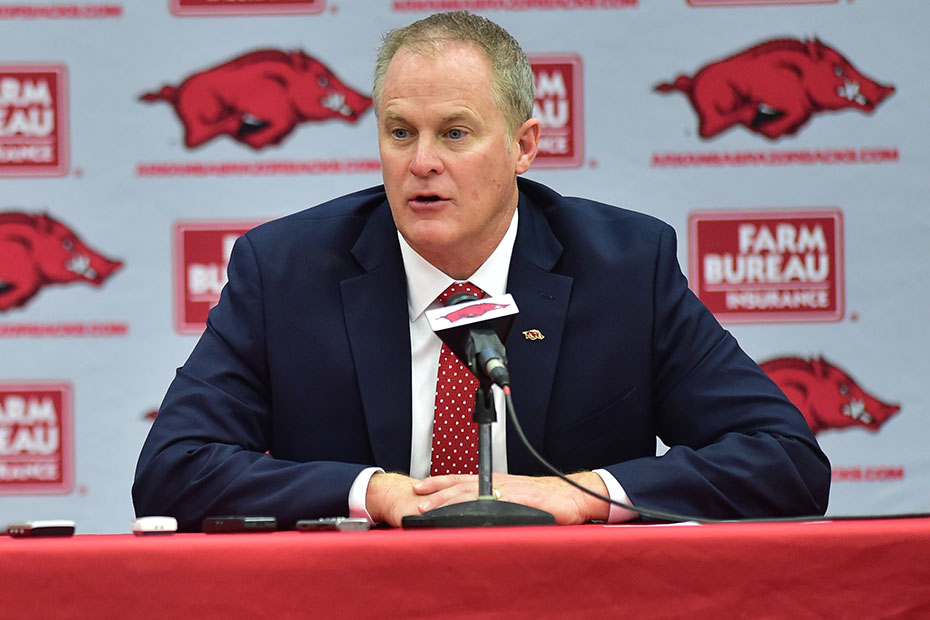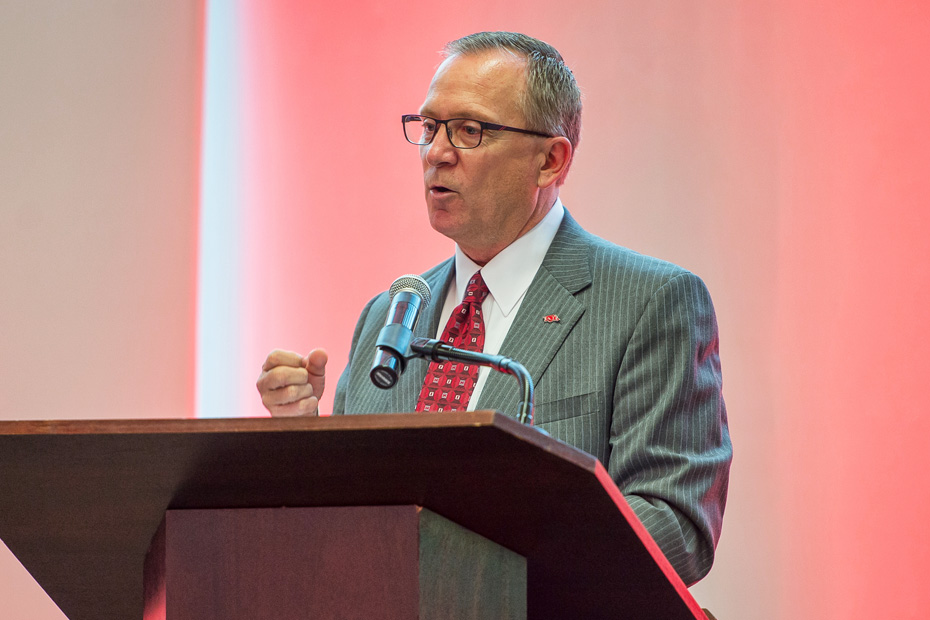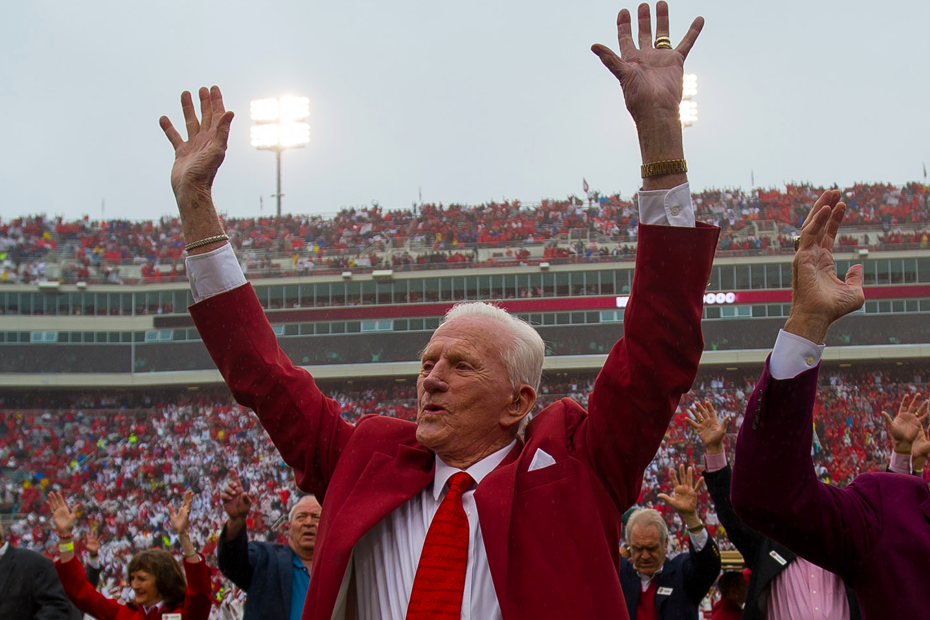Hunter Yurachek (2017-pres)

University of Arkansas Chancellor Joseph Steinmetz announced today the appointment of Hunter Yurachek as vice chancellor and director of athletics, effective immediately. Yurachek currently serves as the vice president for athletics at the University of Houston.
He will be formally introduced to the state and to members of the media later this week at a time to be determined.
“I am thrilled to welcome Hunter to the Razorback family,” said Steinmetz. “He possesses the experience, the management skills and the passion to have an immediate impact on our university. I know that as Razorbacks around our state and country get to know him, they will know that we are in good hands. We welcome Hunter, Jennifer and their children to Arkansas.”
During the 2016-17 academic year, 11 of the 17 varsity sports programs at the University of Houston qualified for NCAA postseason competition, teams won five American Athletic Conference team championships and 21 individual conference titles. Prior to arriving at Houston, Yurachek served as Director of Athletics at Coastal Carolina University, where Coastal won 29 Big South Conference championships. Yurachek was named Under Armor FCS Athletic Director of the Year in 2014. He has also worked at the University of Akron, the University of Virginia, Western Carolina University, Vanderbilt University and Wake Forest University.
“The opportunity to serve the Razorback program is both humbling and exciting,” said Yurachek. “There is so much already in place, and we will quickly build on that foundation to win championships. We will do so with integrity and while continuing to be a great source of pride for the entire state of Arkansas. I want to thank Chancellor Steinmetz and those involved with the search process. Jennifer, myself and our family cannot wait to join the Arkansas Razorback family.”
A native of Richmond, Virginia, Yurachek earned a bachelor’s degree in business management from Guilford College in 1990 and a master’s degree in sports administration from the University of Richmond in 1994. He was a four-year letter winner in basketball at Guilford. Yurachek and his wife, Jennifer, have three sons, Ryan, Jake and Brooks.
“I want to thank the members of the advisory committee,” added Steinmetz. “Lance Harter, Ben Hyneman, Gerald Jordan, Stacy Lewis, Peter MacKeith, Rick Massey and Bill Montgomery all who provided invaluable input into the search and candidates. I also want to recognize the excellent vetting and background work conducted on the final candidates by executive search firm Korn Ferry.”
Jeff Long (2008-2017)

Entering his 10th full year as Vice Chancellor and Director of Athletics, Jeff Long helped transform the University of Arkansas’ Department of Intercollegiate Athletics into one of the most successful and mission driven programs in the country. Long, the 2015 SportsBusiness Journal (SBJ) and SportsBusiness Daily (SBD) Athletic Director of the Year, led a program that encompasses 19 sports and more than 460 student-athletes.
Long focused every aspect of the Razorback program on achieving the mission of developing student-athletes to their fullest potential through intercollegiate athletics. In the process, he also emerged as a nationally respected leader within intercollegiate athletics and an influential voice on issues pertaining to student-athletes and their collegiate experience.
Long served as the inaugural College Football Playoff selection chairman for the 2014 and 2015 seasons and remains a member of the selection committee through 2017. He was recently named to the NCAA Division I Football Oversight Committee and continues to serve as the athletics director representative on the Southeastern Conference’s Executive Committee.
Even while representing his institution and the state in some of the most prestigious leadership positions in college sports, Long guided the Razorback program to unprecedented success. In Long’s tenure, Arkansas captured 34 conference championships and advanced to 139 post-season competitions, including the school’s first Bowl Championship Series appearance in football and national titles at the 2013 NCAA Men’s Indoor and the 2015 NCAA Women’s Indoor Track and Field Championships and the 2016 NCAA Outdoor Track and Field Championships.
In 2016-17, Arkansas finished No. 20 in the Learfield Directors Cup, marking the eighth Top 25 finish in the last 10 years. Arkansas scored points in 16 of its 19 sports, finishing second in the nation among programs with 19 or fewer sports. The Razorbacks added another six SEC crowns to their collection including a conference Triple Crown in women’s cross country, indoor and outdoor track and field. Arkansas also advanced to the SEC Tournament Championship games in baseball, men’s basketball and soccer.
In the classroom, the Razorbacks continued to set new standards including posting a school record student-athlete grade point average of 3.25. Arkansas once again exceeded the national APR multi-year rate in all 19 sports, including posting its highest program average ever (977.8). The program’s Graduation Success Rate was a record 78 percent and 100 current or former Razorback student-athletes added their names to Senior Walk as University of Arkansas graduates.
Student-athlete development was also a priority. A $10.65 million gift from the family of former Razorback and Dallas Cowboys owner Jerry Jones, the largest gift to athletics in more than two decades, transformed an already nationally recognized program into one that rivals any in the country. The Jerry and Gene Jones Family Student-Athlete Success Center is a 55,000 square foot facility dedicated to the development of more than 460 Razorback student-athletes.
Even before his appointment as the CFP Selection Committee’s Chairman, Long’s leadership and unwavering commitment to the student-athletes and maintaining integrity within intercollegiate athletics had not gone unnoticed. In 2013, Long was named as an Under Armour Athletics Director of the Year for the Football Bowl Subdivision. In 2012, Long was named a finalist for the SBJ/ SBD Athletic Director of the Year. In the spring of 2012, the Donald W. Reynolds Foundation and longtime chairman Fred W. Smith made a combined gift of more than $1.25 million to the program in recognition of Long’s leadership of Razorback Athletics.
As a member of the Chancellor’s Executive Committee, Long helped to chart the course for the future of higher education at the University of Arkansas while integrating Razorback Athletics into the campus community. Arkansas is one of less than 25 institutions in the nation to have a financially self-sustaining athletics department. Razorback Athletics receives no state funding and does not collect a student fee. In fact, the department routinely gives millions of dollars each year to support other campus academic programs.
In each of the past seven years, Razorback Athletics has transferred funds totaling more than $1 million to support the university’s academic mission. For 2017-18, the department’s total support of university and student programs and initiatives will include more than $3.5 million in direct funding of academic programs.
Long was selected to replace legendary athletic director and former Razorback football coach Frank Broyles and even before he officially took the reins on Jan. 1, 2008, Arkansas announced that it would combine its previously independent men’s and women’s athletic programs. Long adeptly blended the athletic programs into one unified department and established a new administrative structure.
Under Long’s leadership, the program fortified its financial standing ensuring more support for the development of student-athletes. Long signed Arkansas to a decade long deal with IMG College to form Razorback Sports Properties that guaranteed the Razorback program $73 million. Long also negotiated an extensive all sports apparel and footwear agreement with NIKE, Inc. for all 19 Razorback sports programs.
In 2010, Long launched the “Answer the Call” campaign through the Razorback Foundation which resulted in more than 2,600 new members and helped generate more than $6.5 million in additional support for Razorback student-athletes.
With an eye towards the future, Long commissioned a comprehensive plan to assess the future facility needs of the program. Unveiled in October 2011, the Razorback Athletic Facilities Master Plan provided a vision and the road map for $320 million of facility renovations and additions that will help all 19 Razorback sports remain competitive in the SEC and nationally over the next 30 years.
Projects already completed as part of the plan include the Fred W. Smith Football Center, the Basketball Performance Center, the Jerry and Gene Jones Family Student-Athlete Success Center, the Fowler Family Baseball and Track Training Center, extensive renovations of the George Billingsley Tennis Center, John McDonnell Field (outdoor track and field), Razorback Field (soccer) and the Fred W. Smith and Mary B. Smith Golf Training Facility.
Construction is already underway on the next chapter in the storied history of the Home of the Razorbacks, a $160 million Donald W. Reynolds Razorback Stadium and North End Zone Addition. The project will enhance the game day experience for all Razorback fans with a south end video board, a full 360 degree stadium concourse, new suites and club seats as well as new stadium entrances. The additional video board will be ready for the 2017 season with the completion of the full project prior to the 2018 season. No university funds, state funds or student fees will be required to complete the project.
According to a recent economic impact study, Razorback Athletics generates $162.7 million annually to the region’s economy. In addition, recent athletic construction has generated another $110.9 million for the region.
A veteran administrator with a track record of the highest commitment to the concept of “student-athlete,” Long has had more than two decades experience in athletic administration at the Division I level including at the University of Pittsburgh, University of Oklahoma, University of Michigan, Virginia Tech University, Eastern Kentucky University and Rice University. Long also understands the coach’s perspective from time spent in coaching staff positions at Duke University, University of Michigan and North Carolina State University.
His experience as an athletic director and administrator in five of the six Bowl Championship Series conferences — the Big 12, Big Ten, Big East, Atlantic Coast and SEC — gives Long a uniquely informed perspective on intercollegiate athletics.
On the forefront of NCAA governance, Long has previously served on the NCAA Management Council, the NCAA’s Sports Wagering Task Force, the NCAA Championships/Sports Management Cabinet and as a member of the Executive Committee of the Division I-A Athletic Directors’ Association.
Prior to assuming his current roles at Arkansas, Long served for four years as the athletic director at the University of Pittsburgh. Long redefined Pitt athletics, most notably through the “Quest for Excellence” campaign that raised nearly $34 million to enhance the student-athlete experience. During his tenure, the program was selected No. 17 in the nation in the 2006 Sports Illustrated on Campus’ All-Sport Rankings.
Before arriving at Pitt, Long was senior associate athletic director at Oklahoma for two and a half years overseeing external affairs for the Sooners. In addition, Long was the primary administrator for the Sooners’ highly successful football and men’s basketball programs, along with sport supervision of baseball, wrestling and both golf teams.
Long’s first appointment as a director of athletics was at Eastern Kentucky where he served for two and a half years. Prior to Eastern, Long had a brief stay with Virginia Tech as an associate athletics director.
He began his career in college athletic administration at Michigan, hired by legendary coach and athletics director, the late Bo Schembechler. During his seasons with the Wolverines, Long was promoted through a series of posts to the position of associate athletics director.
A former two-sport athlete at Ohio Wesleyan, Long earned seven varsity letters for the Bishops in football and baseball before completing his degree in economics in 1982. He started his post-graduate career in athletics working on head coach Tom Reed’s staff as a graduate assistant football coach at the cradle of coaches, Miami University of Ohio. Long earned his master’s in education at Miami in 1983, moving on to football staff positions at Rice, Duke and N.C. State prior to joining Michigan.
An Ohio native from Kettering, Long is married to the former Fanny Gellrich of Ann Arbor, Mich. The Longs have two daughters, Stephanie and Christina. In spring 2016, Stephanie graduated Summa Cum Laude with two degrees from the Fulbright College of Arts and Sciences. She is currently enrolled in graduate school at the University of Arkansas. Christina is a freshman journalism student at the University of Missouri.
Frank Broyles

Broyles arrived in Fayetteville in December 1957, beginning a more than five-decade affiliation with the University of Arkansas and the Razorbacks as a coach and athletics administrator. In 19 seasons (1958-76) as the Razorbacks’ head football coach, Broyles amassed a record of 144-58-5, seven Southwest Conference (SWC) titles, 10 bowl bids, 20 All-Americans and 88 All-SWC selections.
In 1964, Broyles led the Razorback football team to an undefeated season that culminated in a 10-7 win over Nebraska in the Cotton Bowl. The National Championship was awarded to the Razorbacks by the Football Writers Association of America (FWAA) following the bowl games. The Cotton Bowl was part of a school record 22-game winning streak launched in the final game of the 1963 season and ending in the 1966 Cotton Bowl.
In 1973, Broyles was named UA Director of Athletics, a title he balanced with his head coaching duties until 1976 when he retired as Razorback head coach. Soon after his retirement from coaching and while still serving as athletics director, Broyles made a move to the broadcasting booth working alongside legendary sports announcer Keith Jackson with ABC’s college football coverage for nine years.
During his 34 ½ years as Athletic Director (1973-2007), Broyles transformed the Razorbacks from a program competitive primarily in football to one of the most successful all-sports programs in the nation. His vision and leadership was the driving force behind the University of Arkansas moving to the Southeastern Conference (SEC) in 1990. The move set the stage for the program’s growth and future success while dramatically changing the landscape of intercollegiate athletics.
Arkansas won 43 national titles, 57 SWC titles, and 48 SEC titles, and the football team went to 22 bowl games during his tenure as athletic director. Broyles worked tirelessly to build and renovate athletic venues including Bud Walton Arena, Donald W. Reynolds Razorback Stadium, Baum Stadium at George Cole Field, John McDonnell Field and the Mary B. and Fred W. Smith Razorback Golf Center. Following his tenure as athletic director, Broyles continued to serve the program at the Razorback Foundation (2008-14).
Broyles garnered numerous prestigious awards throughout his career and was inducted into more than a dozen Halls of Fame. A member of the inaugural class of the UA Sports Hall of Honor, he was inducted into the College Football Hall of Fame in 1983. He is also a member of the Arkansas Sports Hall of Fame, Cotton Bowl Hall of Fame, Gator Bowl Hall of Fame, Georgia Tech Hall of Fame, Orange Bowl Hall of Fame, National Association of Collegiate Directors of Athletics Hall of Fame, SWC Hall of Fame and the State of Georgia Hall of Fame among others.
Broyles was honored by the National Football Foundation as the 2000 recipient of the John L. Toner Award for outstanding achievement as an athletic director. The Arkansas Democrat-Gazette named him the most influential figure in athletics in the state during the 20th century. Broyles was active in the Fellowship of Christian Athletes, including serving as its chairman from 1971-73 and later being named as a Lifetime Trustee of the organization.
In 1996, the Broyles Award was created in recognition of his long-standing history of developing successful assistant coaches. The Broyles Award is given annually to college football’s top assistant coach. In 2007, the field at Donald W. Reynolds Razorback Stadium was dedicated as Frank Broyles Field.
George Cole
John Barnhill
James B. Craig



